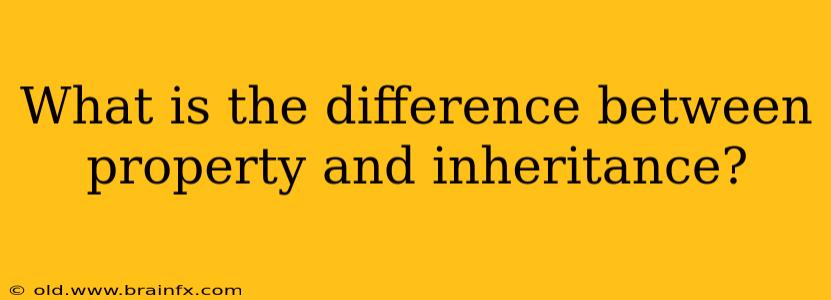Understanding the difference between property and inheritance is crucial for anyone navigating legal, financial, or family matters. While often used interchangeably in casual conversation, these terms have distinct legal meanings with significant implications. This guide delves into the core distinctions, exploring their definitions, characteristics, and practical examples.
Defining Property
Property, in its broadest sense, refers to anything of value that can be owned. This encompasses a vast array of assets, both tangible and intangible.
Types of Property:
-
Real Property (Real Estate): This includes land and anything permanently attached to it, such as buildings, houses, mineral rights, and fixtures. Ownership of real property is typically documented through a deed.
-
Personal Property (Personalty): This encompasses all movable possessions, including vehicles, furniture, jewelry, artwork, intellectual property (like copyrights and patents), and financial assets (stocks, bonds, bank accounts).
-
Intellectual Property: This category deserves special mention due to its intangible nature. It includes creations of the mind, such as inventions, literary and artistic works, designs, and symbols, protected by law.
Defining Inheritance
Inheritance, on the other hand, specifically refers to the acquisition of property after someone's death. It's the process by which assets are transferred from a deceased person (the testator or decedent) to their heirs or beneficiaries, as outlined in a will or, if no will exists, according to the laws of intestacy (rules governing inheritance without a will).
Key Aspects of Inheritance:
-
Will vs. Intestacy: A will dictates how assets are distributed. If there's no valid will, state laws determine inheritance, often prioritizing close relatives.
-
Heirs and Beneficiaries: Heirs are individuals entitled to inherit under the law, while beneficiaries are named in a will to receive specific assets.
-
Probate Process: The legal process of validating a will, paying debts, and distributing assets is known as probate. This can be a complex and time-consuming procedure.
Property vs. Inheritance: A Clear Comparison
The fundamental difference lies in acquisition. Property is something owned, while inheritance is the process of acquiring property after someone's death. You can own property without inheriting it, and you can inherit property without previously owning it.
| Feature | Property | Inheritance |
|---|---|---|
| Acquisition | Purchase, gift, creation, etc. | After the death of the previous owner |
| Ownership | Exists during the owner's lifetime | Transfers upon death |
| Transfer | Can be transferred during lifetime (sale, gift) | Transferred upon death (through will or intestacy) |
| Legal Basis | Property laws, contracts | Probate law, wills, intestacy laws |
Practical Examples
-
Example 1: You buy a house. The house is your property.
-
Example 2: Your grandmother leaves you her antique jewelry in her will. The jewelry becomes your property through inheritance.
-
Example 3: You own a car. It’s your property. When you die, your car is part of your estate and will be passed to your heirs through inheritance.
Conclusion
Understanding the distinction between property and inheritance is vital for various reasons, from estate planning and tax implications to family disputes and legal proceedings. While both relate to ownership, one represents current possession, and the other signifies acquisition upon death. Seeking legal counsel is advisable when dealing with complex inheritance matters or significant property transactions.

